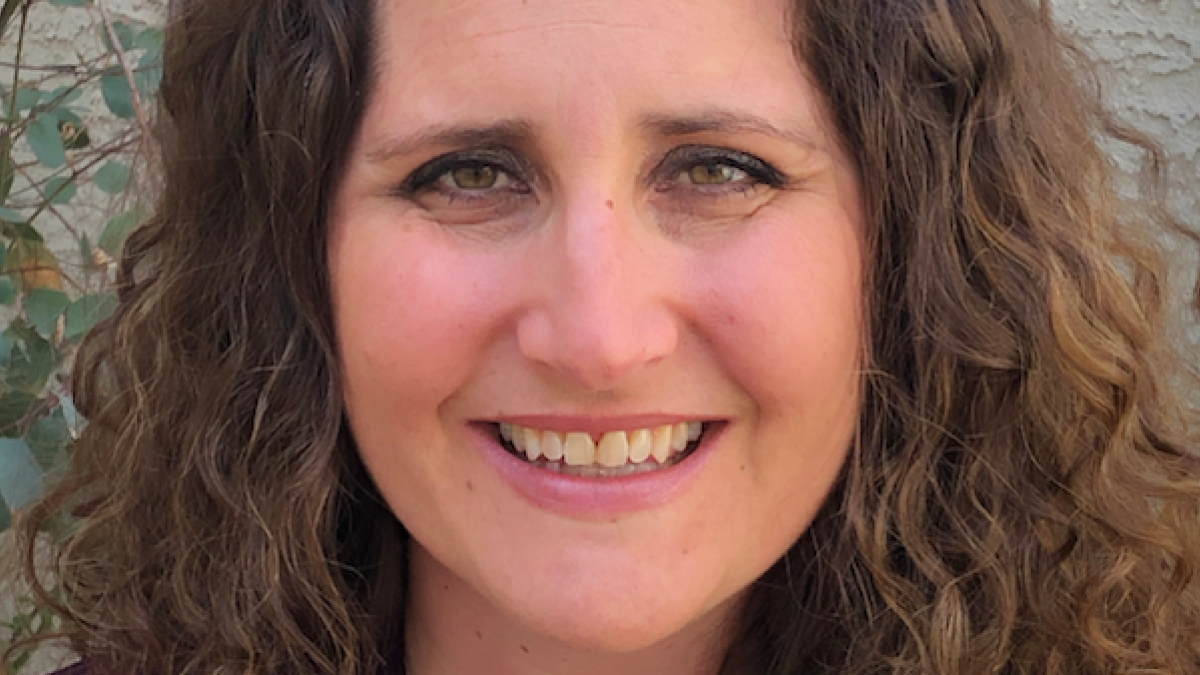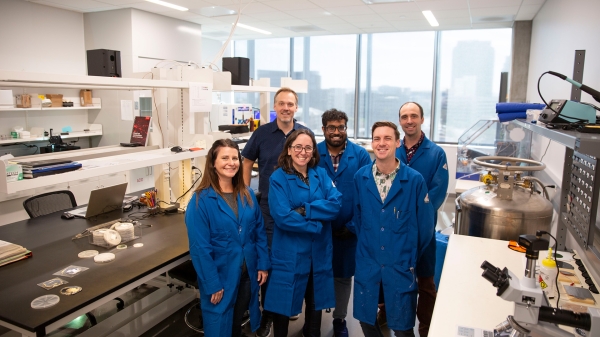From French literature to the lab: Biochem grad finds true passion in synthetic biology

Bethany Kolbaba Kartchner
Editor’s note: This story is part of a series of profiles of notable fall 2023 graduates.
Bethany Kolbaba Kartchner is by all accounts a true Renaissance woman. She has a master's degree in French literature and is about to graduate from ASU’s School of Molecular Sciences with a PhD in biochemistry.
But before her journey started at ASU, when she decided she wanted a science degree, it had been more than 10 years since she had completed the basic science classes necessary to enroll in a graduate program. In addition, she had a family who needed her. Kartchner spent a month researching ASU's biochemistry programs, strategizing how she could take classes and still be the primary caretaker of her children.
“It was very important to me that their lives would not be affected by my new pursuit,” stated Kartchner. “I enrolled in one online class at Rio Salado every four months until I had taken all the necessary classes they offered. Then, I took higher-level, in-person classes and labs at Mesa Community College because they had an excellent preschool program for my youngest child. Once I had taken all of the classes I could at the community college level, I applied to ASU to complete my second bachelor’s degree, in biochemistry.”
When Kartchner came to ASU, she was incredibly nervous. The school seemed so big, and she wasn't sure she’d be accepted as a nontraditional student, as most of her classmates were decades younger than her.
“I needn't have worried,” explained Kartchner. “Everyone was very welcoming, and the professors were incredibly accessible. I quickly found study partners and settled into a nice routine.”
One of her professors, Marcia Levitus, took a special interest in Kartchner and helped her to hone her interests and identify a lab where she could gain experience to apply to the doctoral program. She found a position in Professor Jeremy Mills’ lab working with proteins. She was especially attracted to professor Mills' work due to the range in research — from designing proteins on a computer to putting the gene that encodes that protein into E. coli, characterizing the protein and solving its structure using X-ray crystallography.
“His lab really does everything and I've been fortunate to gain experience in all aspects of the protein design workflow,” said Kartchner.
“In the laboratory, Beth was far more than simply an excellent researcher,” said Mills. “Rather, Beth served as a manager, mentor and confidant to her colleagues — and at times her advisor — and was always incredibly generous with her time.
“Beth was often the first person I would introduce new students to because I was certain that she would make them feel welcome in the laboratory regardless of their experience or background,” Mills continued. “As much as I’d like to have Beth in the laboratory still, I am so excited that she has moved on to bigger and better things. I can say without hesitation that having Beth in our laboratory for the last few years has shaped how we do things in ways that will continue for years to come. I am so grateful to Beth that she gave me the privilege of being able to work with and learn from her.”
During 2021, Kartchner worked remotely for Moderna in the Computational Sciences and Molecular Engineering Division, where she implemented the Rosetta RNA tertiary structure prediction platform.
Editor's note: Answers may have been edited for length or clarity.
Question: What was your “aha” moment when you realized you wanted to study the field you majored in?
Answer: I was driving my children to their activities and listening to Science Friday on NPR. Ira Flatow, the host, was interviewing J. Craig Venter about his book "Life at the Speed of Light: From the Double Helix to the Dawn of Digital Life." In the interview, they discussed a field that was completely new to me — synthetic biology, which is basically reengineering biology for human purposes. I was immediately intrigued and I knew that I wanted to become proficient in this field.
Preparing to come to ASU took me about four years. I studied every weekday from 4–6 a.m. while the children slept, and on Sunday afternoons, I would go to the public library from 1–5 p.m. When we went on family vacations, I kept up my regime, often studying in closets because they were the only place where turning on a light wouldn't wake the family. I have a very special memory of studying biology in a closet in an Airbnb in Nevada. I was learning about ribosomes and how they translate mRNA into proteins, and this feeling of complete joy swept over me. I absolutely loved what I was doing. It was so exciting to learn about the world.
Q: What’s something you learned while at ASU — in the classroom or otherwise — that surprised you or changed your perspective?
A: I expected my graduate work to challenge me academically, so when I struggled with an abstract concept, that didn't surprise me. What I didn't expect was that graduate work would challenge me personally. I didn't know that the struggles that I would go through would change the way I see myself and my world. I've become a much stronger person and a much more critical thinker because of my studies at ASU.
Q: What’s the best piece of advice you’d give to those still in school?
A: School is hard and can be overwhelming at times. Break down big projects into smaller steps and work on them methodically. All the small daily steps move you closer to your goals.
Q: What advice would you give anyone who is contemplating taking on a big project or working toward a long-term goal?
A: Don't be afraid of really long-term goals. When I was 36 and contemplating whether I should pursue my doctorate degree in biochemistry, I knew that the path would be long and that I would be 47 years old when I finished. Initially, that thought was very daunting. However, I knew that eventually, I would be 47 and I'd either be 47 with a doctorate or 47 without one. I decided that I wanted to be 47 with a doctorate so I got started.
Q: What are your plans after graduation?
A: I'm working as a scientist of computational biology for a biotech startup (FL83) in the Flagship Pioneering ecosystem based in Boston. I work remotely and travel to Boston every few months to work on site. I love what I'm doing.
More Science and technology

ASU professor honored with prestigious award for being a cybersecurity trailblazer
At first, he thought it was a drill.On Sept. 11, 2001, Gail-Joon Ahn sat in a conference room in Fort Meade, Maryland.…

Training stellar students to secure semiconductors
In the wetlands of King’s Bay, Georgia, the sail of a nuclear-powered Trident II Submarine laden with sophisticated computer…

ASU startup Crystal Sonic wins Natcast pitch competition
Crystal Sonic, an Arizona State University startup, won first place and $25,000 at the 2024 Natcast Startup Pitch Competition at…